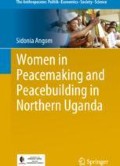Abstract
Women have contributed to stopping violence and alleviating its consequences in a range of ways: providing humanitarian relief, creating and facilitating the space for negotiations through advocacy, and exerting influence through cultural or social means. The case studies have documented women’s peacebuilding practices, the challenges and opportunities they have faced, and the lessons they have drawn from their experiences. They cover areas as far apart as Bougainville, Sierra Leone and Northern Ireland and describe women’s involvement in peace processes. Women have carried out these activities through spearheading civil society and reconciliation activities, and by highlighting how conflict impacts on their gender roles and relations. Women have responded to conflict and its effects, some of which challenged traditional female roles, by joining armed groups, both as combatants and as support, while others have taken over household and community duties normally assigned to men.
Access this chapter
Tax calculation will be finalised at checkout
Purchases are for personal use only
Notes
- 1.
The matrilineal system is found all over Bougainville except in parts of south Bougainville (Buin and Siwai), Nissan Island and a group of Polynesian islands.
References
Anderlini, S.N., 2007: Women Building Peace: What they do, Why it Matters (Colorado: Lynne Rienner Publishers).
Congressional Research Services (CRS), 2005. Liberia’s Post War Recovery: Key Issues and Development. Congressional Research Services, 13 December.
Hunt, S.; Posa, C., 2001: “Women Waging Peace”, in: Foreign Policy, 124(May–June): 38–47.
International Alert, 2007: Inclusive Security, Sustainable Peace: A Toolkit for Advocacy and Action (London: International Alert).
Kirk, J., 2004: “Promoting a Gender-Just Peace: The Roles of Women Teachers in Peacebuilding and Reconstruction”, in: Gender and Development, 12,3: 51–70.
Laplante, L., 2007: “Women as Political Participants: Psychosocial Post-conflict Recovery in Peru”, in: Peace and Conflict: Journal of Peace Psychology, 13,3: 23–30.
Lone, J., 2009: Women and Peace Making: Realizing the Vision of Security Council Resolution 1325 in the Peacemaking Work of the United Nations’ Department of Political Affairs (New York: UNDPA).
Roulston, C., 1999: “Inclusive Others: The Northern Ireland Women’s Coalition in the Peace Process”, in: Scottish Affairs, 26 (winter): 11.
Saovana-Spriggs, R., 2003: “Bougainville Women’s Role in Conflict Resolution in the Bougainville Peace Process”, in Dinnen, Sinclair; Jowitt, Anita; Cain, Tess Newton (Ed.): A Kind of Mending: Restorative Justice in the Pacific Islands (Canberra: Pandanus Books): 195–214.
Saovana-Spriggs, R., 2007: Gender and Peace: Bougainville Women, Matriliny, and the Peace Process (Ph.D. thesis, Australian National University).
Schirch, L.; Sewak, M., 2006: “Introduction: Using the Gender Lens”, in: People Building Peace, 2,13.
Sirleaf, E.J., 2002: Women, War, Peace and Disarmament, Demobilization and Reintegration (DDR) (New York: UNIFEM).
Stensrud, E.; Husby, G., 2005: Resolution 1325: From Rhetoric to Practice: A Report on Women’s Role in Reconciliation Processes in the Great Lake region of Africa (Oslo: Care Norway and International Peace Institute, Oslo).
Temmerman, E.D., 2001: Aboke Girls: Children Abducted in Northern Uganda (Kampala: Fountain Publishers).
United Nations International Women’s Fund (UNIFEM), 2008: Women, Peace and Security (29 October), UNIFEM.
United Nations International Women’s Fund (UNIFEM), 2007–2008: Women’s Coalition for Sustainable Peace. UNIFEM Annual Report.
United Nations International Women’s Fund (UNIFEM), 2009: Women’s Participation in Peace Negotiations: Where are the Numbers? (June); at: https://reliefweb.int/sites/reliefweb.int/files/resources/03AWomenPeaceNeg.pdf (6 February 2010).
United Nations Security Council Resolution (UNSCR) 1325, 2005: From Rhetoric to Practice: A Report on Women’s Roles in Reconciliation in Conflict Processes in the Great Lake region (Oslo: CARE Norway and International Peace Research Institution, 2005; Women in Parliament; International IDEA and Stockholm University, 2005; Global Database of Electoral Quotas for Women); at: www.quotaproject.org (30 January 2010).
United Nations Security Council Resolution (UNSCR), 2002: Women, Peace and Security (New York: United Nations).
Author information
Authors and Affiliations
Corresponding author
Rights and permissions
Copyright information
© 2018 Springer International Publishing AG, part of Springer Nature
About this chapter
Cite this chapter
Angom, S. (2018). Case Studies of Women in Peacemaking and Peacebuilding: Empirical Evidence. In: Women in Peacemaking and Peacebuilding in Northern Uganda. The Anthropocene: Politik—Economics—Society—Science, vol 22. Springer, Cham. https://doi.org/10.1007/978-3-319-75883-1_3
Download citation
DOI: https://doi.org/10.1007/978-3-319-75883-1_3
Published:
Publisher Name: Springer, Cham
Print ISBN: 978-3-319-75882-4
Online ISBN: 978-3-319-75883-1
eBook Packages: Earth and Environmental ScienceEarth and Environmental Science (R0)

